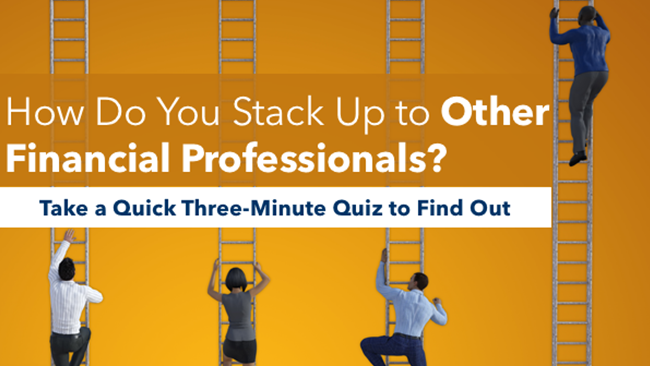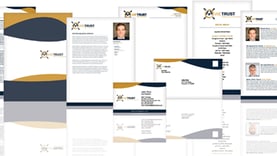If you aren’t quite sure why you aren't where you want to be in your financial practice, I would encourage you to read this post. Because the psychological phenomenon we’re going to discuss may be at the root of that.
And the truth is, left unchecked, it could ultimately destroy your business. The good news? 
Getting rid of imposter syndrome or minimizing it could mean higher-quality clients, increased income, more job satisfaction and greater impact.
It might surprise you to hear that some of the most successful people experience Imposter Syndrome. Industry superstars like Michael Kitces and Car Richards have admitted to battling with this feeling as they have advanced their careers to nosebleed heights in the financial services industry, which they talk about on their podcast.
Hollywood stars have even spoken openly about it.
If you’ve had feelings of self-doubt, low self-confidence, anxiety, fear, negative and destructive thoughts and feeling like a fraud in your profession – congratulations, you’re just like 70% of all people who’ve suffered from imposter syndrome at some point in their life.
Let’s see if imposter syndrome has had you riding the brake while also trying to step on the gas (and if so, how to fix it).
How to know if you’re suffering from imposter syndrome
For those who haven’t heard the term, imposter syndrome is a cognitive bias to doubting one’s own ability and accomplishments to the point that you feel like a fraud. Even if reality says otherwise.
As you become increasingly successful in your field of expertise and more valuable to your marketplace, it’s natural to feel like a fraud. Folks wrestling with imposter syndrome may think to themselves, Don’t my client’s know who I am? Don’t they know where I came from. I’m not that special or that valuable. However, they have become increasingly valuable through years of personal development and growth.
They seem to devalue their expertise and services feeling that everyone is as capable of accomplishing what they've done, but it’s not true. They have separated themselves from everyone else, and what they have done is not easy for everyone else.
If you have any of these symptoms, you might have a case of imposter syndrome. Are you…
• Struggling to find clients? Sometimes our own “stuff” gets in the way of our prospecting efforts. You may not even do any prospecting because a voice in the back of your head has already decided that you don’t bring value so why bother.
It’s also possible that you do get people who express interest in working with you, but you end up turning them away (consciously or unconsciously) because you don’t believe you’re capable of helping them.
• Doubting the value you bring to the table? We know from our old buddy Jim Rohn that we get paid proportionate to the value we bring to the marketplace. If you don’t acknowledge or have confidence around the value you add, it’s highly likely your prospects won’t either.
• Working with less than ideal clients? If you’ve ever thought or said, I don’t want to work with this client, but I need the business… You’ve got an imposter syndrome problem. If you believe that you have to take every client that comes along — regardless of whether they’re in your niche, regardless of how difficult they are to work with, regardless of what they pay you, you will eventually grind your business into the ground.
Because you can’t make a good living when you aren’t working with ideal, quality clients. This thought that “you’re lucky to get their business” can be a death sentence for your financial practice. And that’s not because you don’t appreciate people, it’s because you have to have standards and you have to think highly enough of the services you provide, that you aren’t willing to bend over backward for someone who doesn’t respect that.
• Delivering sub-par service? Now this one might seem counterintuitive, not to mention hard to admit. But the fact is, when we believe we’re ‘less than,’ we end up playing that part. It’s called a ‘self-fulfilling prophecy.’ Even if we aren’t truly delivering less than stellar service, if we have imposter syndrome we can be so caught up in ‘comparison-itis’ that we THINK we aren’t doing as well or aren’t as good as others we see in our space.
If you compare yourself to others obsessively — you’ll never measure up. It’s ok to look to others for advice, guidance, or mentorship but the only person you should truly be competing against is yourself.
One of my favorite ways of looking at growth in business I heard from author, James Clear. He points out that we often set goals and look toward milestones to determine our progress, but that can make us feel like we’ve never quite made it.
Instead, if we measure progress backward, we not only see how far we’ve come, but we can also use it to set appropriate goals for where we want to go next in our business. If you look at your short-term results, say making 10 calls and landing two clients last week – your goal becomes “make 20 sales calls next week or schedule another seminar.”
For those who’ve never experienced imposter syndrome
Believe it or not, there is a silver lining to a touch of imposter syndrome, it means you’ve got room to grow and you’re humble enough to recognize that.
I remember telling my mom once that I was feeling like a bad parent and what she said has stuck with me over the years, not just from a parenting perspective but all areas of life:
“The fact that you’re questioning whether you’re doing a good job, likely means you are!” Moms are so smart!
On the other hand, if you’ve never felt any imposter syndrome AT ALL, that might actually be a problem too. It may be time to take a look at the man (or woman) in the mirror. Yes, the whole point of this post was to talk about eliminating imposter syndrome, but really…
A little isn't bad, but you don't want to let it completely overtake your life and ruin your business.
Maybe this is you…
Closely tied to this concept is the Lone Ranger Syndrome. This is a belief that we have to do everything ourselves and if we CAN’T then we’re a fraud. It’s basically setting yourself up for failure and disappointment because rarely can someone say they’re a ‘self-made man or woman.’
We all like to think we got to where we are today entirely on our own, but most of the time the successful people are those who know what they excel at and focus on that while seeking help for the things they can't do or choose not to do because it isn't the best use of their time.
Elevate your thinking, your business will follow
You may have felt Imposter Syndrome AND Lone Ranger Syndrome at some point in your life and business. Trying to do everything to prove you aren’t a fraud can actually cause you to do a subpar job because your attention and effort is spread too thin. It’s one of the reasons why we encourage financial professionals we work with to consider hiring a staff to support them.
Additionally, when someone goes through our Elevate program, they open up about what’s working in their business and what’s not. Transparency can be a relief to someone suffering from imposter syndrome. There’s no need to “hide” behind this vision of who you’re supposed to be that maybe you feel you aren’t living up to.
Those that move through our entire 4-step process learn what they’re doing right and acknowledge their successes but also find out what they can work on. They no longer have to be a ‘lone ranger’ or feel like a fraud, they’ve got the support of the team in achieving their business goals.
By overcoming imposter syndrome, they can continue to grow within their business and make a bigger impact.
And you can too.
If you liked this post, please share it or, better yet, subscribe to our blog by entering your name and email on this page.





